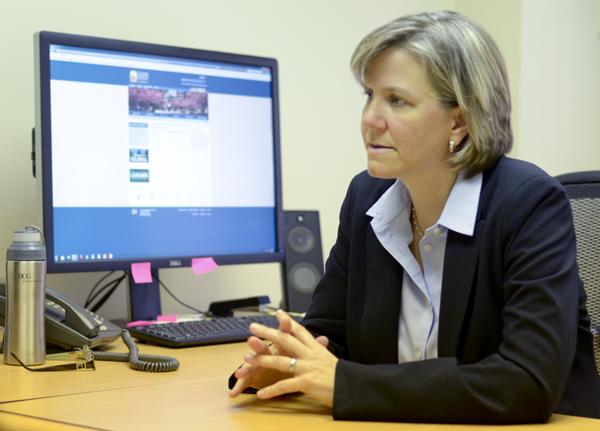Updated Oct. 25, 2013 at 11:41 a.m.
Shortly after Laurie Koehler took charge of the University’s admissions and financial aid offices three months ago, she realized that GW was misleading prospective students about how it decided its freshman class.
She reviewed GW-stamped materials and presentations, trying to clean up an admissions office that had also admitted to reporting inflated rankings data last year. But, she said, administrators failed to notice that the website still heralded GW as need-blind.
“It became apparent that we were not consistently telling the full story about the role of financial need in our admissions process,” Koehler, senior associate provost for enrollment management, said in an email Wednesday.
That discrepancy came to light Monday, when a Hatchet report spread nationally and the University’s plans to quietly change years of misleading marketing fell to pieces.
The University came under fire for misleading applicants about its need-aware policy, which is used at several top schools, and pushes admissions officers to waitlist some students who need more financial aid than their peers. The policy helps colleges meet more financial need for the rest of its top applicants, administrators and experts say.
Koehler issued an apology for the University’s false messaging Tuesday.
Multiple officials, including University President Steven Knapp, Provost Steven Lerman, Senior Vice Provost for Academic Affairs Forrest Maltzman and former president Stephen Joel Trachtenberg, said this week that they did not know GW’s admissions policy was being falsely communicated.
In an interview Thursday, Knapp insisted that he would not “jump to conclusions” about whether admissions officers misrepresented GW’s admissions practices because he doesn’t have “any direct evidence.” That comes two days after he acknowledged in an email that “I understand some admissions officials have used that term [need-blind] in the past” and vowed to look into the misstep.
“I know the accusations were made that people were deliberately misrepresenting this stuff. I don’t know that that was true. We have to find out whether that’s actually true,” Knapp said Thursday. “I don’t want to accuse people of things prematurely.”
Knapp added that he is committed to ensuring that admissions representatives are trained to accurately communicate the admissions policy, a task he has entrusted to Koehler.
“I just want to make sure we’re clarifying what we’re doing and the way we talk about things is the way they’re actually happening,” Knapp said. “I’ve been committed to that all along. That’s why we cleaned up the way we were [reporting rankings data] last year.”
Koehler has pledged to ensure GW’s need-aware policy is accurately portrayed, after an admissions representative told prospective families in an information session Saturday that applications are reviewed without considering financial need.
“I am going to continue to insist that what we say about our practices matches what we do,” Koehler said.
The University announced it would hire an enrollment manager in April 2012 to replace roles previously held by long-serving senior vice president Robert Chernak. Later that year, the admissions office faced another leadership shift. Its previous head, Kathryn Napper, stepped down in December after GW was kicked off the US News & World Report’s best colleges ranking for inflating admissions data.
Since Koehler arrived at GW this summer, she said she has been on her “own fact-finding mission” to not only better understand GW’s applicant pool and student body, but also to help the University better achieve its enrollment goals.
She has now vowed to rebound off the University’s misstep and said she will turn the need-aware policy into a “selling point,” by emphasizing the policy enables GW to meet a larger portion of students’ financial need.
“The admissions practices at GW have not changed with regard to how financial aid requests are factored in,” Koehler said. “What has changed is the new leadership – this includes myself – and what we are trying to do is increase the level of transparency about the admissions process.”
That candor came across in her first interview with The Hatchet in September, when she said she faced an uphill climb reviewing the admissions office’s practices because it was difficult to find “where data is stored and what data is captured and what it’s called.”
Administrators, including Knapp, have emphasized that Koehler’s new leadership marks a shift toward greater transparency and accurate communication from an office that has now twice been hit by publicity blows.
Officials who previously worked closely with Napper, including Director of Admissions Karen Felton and Associate Vice President for Financial Assistance Dan Small, declined through a spokeswoman to sit for interviews this week. Koehler also declined a phone call through a spokeswoman, and only provided email responses.
Though student leaders said they were taken aback when they learned admissions representatives had inaccurately called GW need-blind, many said they trusted Koehler to steer the office on track.
Student Association president Julia Susuni, who meets monthly with Koehler, said she received a call from Koehler immediately after news broke this week. After learning the nuances of the policy, Susuni said she and Koehler planned ways for the admissions office to more effectively communicate with students.
“She’s been great in terms of wanting to be transparent with the entire community,” Susuni said. “I have a lot of confidence in her ability to be honest.”
Sen. Nick Gumas, CCAS-U, who had also previously met with Koehler, lauded her efforts to be more transparent.
The SA Senate passed a resolution applauding the admissions office for “publicly accepting their mistakes,” on Monday, while calling for greater transparency from the office. Gumas said Koehler was doing everything that could be expected of her.
“We are really happy to see an administrator who is working to mitigate the problems at hand,” he said.








